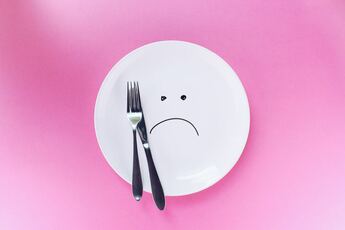Let's explore what happens in the body when you significantly cut down on how much you eat. Typically, when going on a diet, one may start with cutting back on food intake by eating smaller portions, using diet products with the “fat-free” or “zero calorie” labels, and tracking your food to stay within a certain calorie allowance. Does any of this sound familiar? Our body has powerful mechanisms in place that prevent the body weight from deviating drastically from our natural weight set-point. The set-point is defined as the stable adult weight that your body tries to maintain. Your metabolism slows down. Metabolism can be measured by the Basal Metabolic Rate (BMR), meaning the number of calories required to keep the body functioning at rest. The BMR is dependent on a number of factors including age, sex, height, weight, etc. For many of us, the BMR makes up 60-75% of the calories we need in a day, depending on how much physical activity we do in addition to just simply being alive. When you start to significantly reduce caloric intake and increase energy expenditure, your body begins to perceive it as starvation and works hard to "save" you from losing weight by becoming more fuel efficient. In addition, as you lose weight, fewer calories are needed to maintain this new weight. All of this means your BMR will drop after period of restricted intake, resulting in that plateau we see in a typical weight loss trajectory. Your hunger and fullness cues are out of tune. It's pretty obvious to point out that when you are severely restricting your overall intake, you tend to feel hungry, deprived, and have intense cravings which can lead to unhealthy bingeing. Slowed metabolism has been associated with increased hunger and overeating. Let's take a look at why this is the case. A brain region called the hypothalamus is responsible for much of your weight regulation. The feelings of hunger and fullness are the result of complex neuropeptide-hormone (brain chemicals) pathways interacting with your gut, the pancreas, and adipose (fat) tissue (Proietto, 2011). In the body, there are hormones responsible for telling you that you're hungry (ghrelin), and letting you know you're full (leptin). A study of contestants from a reality TV show The Biggest Loser found that at the end of the the 30-week intense weight loss program, leptin levels drastically plummeted (from an average of 41.14 ng/ml to 2.45 ng/ml, a whopping 94%!). Leptin is a hormone produced by fat cells to signal to the brain's hypothalamus that you are full. Without the hormone leptin, the brain does not recognize fullness after eating, leaving the body feeling insatiably hungry. Notably, even after subjects have regained their weight after 6 years, the levels of leptin never quite returned to normal. What this means: from restricting food significantly and chronically, your body changes so that you have to eat even fewer calories to maintain your weight, and makes it harder for you to feel full and satisfied. From an evolutionary standpoint, this metabolic adaptation helped our ancestors survive in the face of food scarcity. With the abundance of food in our current world, this mechanism works against us and results in yo-yo dieting and weight cycling that is detrimental to our health. So your body fights back to maintain your weight set-point, is it worth trying to eat better at all? Absolutely! I know it feels frustrating like an uphill battle to lose weight, but healthy eating has so many benefits beyond the scale. At the end of day, it's not about a temporary diet to fix a problem. Perhaps you've dabbled with the 1000-calorie diet, or tried intermittent fasting, or adopted the ketogenic diet for a period of time. The truth is, any diet is going to result in some kind of short term weight loss. But if you're looking for a healthful and sustainable solution, here are some very key things to keep in mind: 1. Set a realistic goal. Many people strive for a weight that will put them in the "healthy BMI" range of 18.5 - 24.9. For some, this may not be realistic or healthy. Keep in mind that the BMI is not a great indicator of your health because it doesn't take into account body composition (your lean muscle vs. fat mass). It's better used as an indicator to evaluate a population as whole rather than an individual's health status. So what's considered a realistic goal for better health? As a simple rule of thumb, a 5% weight loss is considered "clinically significant". Losing 5-10% of your current body weight is already improving your health metabolically. Do you have a goal weight in mind? A registered dietitian can work with you to determine if your specific goal is realistic and safe to help you build an effective weight management plan. 2. Keep it slow and steady, you’ll get there. When summer is around the corner, it's tempting to fall into the "lose-weight-fast detox cleanses" trap. A rapid weight loss is guaranteed to be unsustainable as you are likely losing mostly water weight, breaking down your muscles, and depriving your body of important nutrients for your daily activities. A diet program that promises a weight loss of over 2 lb/week is considered aggressive and I strongly advise against it. Recall the Biggest Loser study above, putting your body through extreme diet and exercise can lead to disastrous metabolic impairment. A gradual process will prevent your body from triggering the starvation response. If you have questions about what safe nutrition and exercise regimen that can help you effectively burn fat and build muscles, talk to a registered dietitian for more information. 3. A nutritionally complete diet. There seems to be a constant battle between the nutrients: high fat vs. low fat vs. high protein vs. low carb and on and on. Yet many people struggling to lose weight are at the same time missing some incredibly important nutrients such as iron, calcium, vitamin D, vitamin B12, folate, fibre, omega-3, not to mention energy! This could be due to eliminating one or more food groups if you're following a certain diet regimen or have multiple food allergies and sensitivities. Since these nutrients are vital to every processes in body functions and metabolism, deficiencies can result in serious health problems. It's possible to be overweight and undernourished at the same time. Focus on what wholesome, nutritious foods you can add to the diet as opposed to taking away from it. Are you potentially missing out on nutrients important for your health because you are avoiding certain foods? With a thorough a nutrition assessment, a registered dietitian can provide guidance on nourishing your body and getting the most out of your food. 4. It's not just what you eat, it's how you eat. Your food selection is only half the battle. Here is the game-changer fact: how you eat is the key to maintaining a healthy weight and developing a positive relationship with food in the long run. Do you take time and pay attention to your meals? Do you give yourself permission to eat? Do you trust that you can eat whenever you are hungry and recognize when you're full? Do you have regular meals and include a variety of food in your diet? Do you feel in control of your eating and trust yourself with the job of nourishing your body well?
"For many, only focusing on what to eat instead how to eat is the main reason why diets fail."5. Enjoyable physical activity. It is imperative to stay physically active and reduce sedentary time. But that doesn't mean you have to join a gym and run a marathon to be healthy. Many people associate exercise with painful aches and being out of breath. While I'm not an exercise expert, research shows you only need moderate-intensity exercise to burn fat. In fact, fat burning requires a lot of oxygen, so high-intensity activities actually use more of your glycogen (carbohydrate storage) as energy because it's more accessible. Keep in mind, the only physical activity that will be helpful to you is one that you want to do. Whether it's gardening, dancing, yoga, walking your dog, or cycling to work, regular physical activity helps reduce your risk for chronic illnesses, build muscles, relieve stress, improve mental health and digestive health. Fun activities coupled with consistent action planning to create sustainable habits is the key to stay active and achieve better overall health. So there you have it! This is the basic recipe for healthy weight management in a nutshell. In practice, it may seem more complex and challenging, but it is doable. If you have been struggling with diet and weight loss and you are ready to make a real change, here is how an accredited nutrition professional can help:
References:
Comments are closed.
|
ArchivesCategories |







 RSS Feed
RSS Feed
